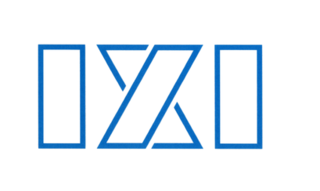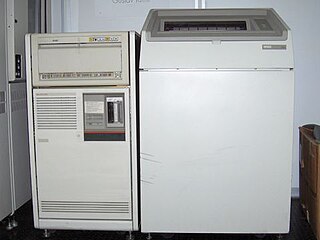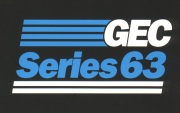Related Research Articles

Data General Corporation was one of the first minicomputer firms of the late 1960s. Three of the four founders were former employees of Digital Equipment Corporation (DEC).

Novell, Inc. was an American software and services company headquartered in Provo, Utah, that existed from 1980 until 2014. Its most significant product was the multi-platform network operating system known as Novell NetWare.

The Santa Cruz Operation, Inc. was an American software company, based in Santa Cruz, California, that was best known for selling three Unix operating system variants for Intel x86 processors: Xenix, SCO UNIX, and UnixWare.

Logica plc was a multinational IT and management consultancy company headquartered in London and later Reading, United Kingdom.

IXI Limited was a British software company that developed and marketed windowing products for Unix, supporting all the popular Unix platforms of the time. Founded in 1987, it was based in Cambridge. The product it was most known for was X.desktop, a desktop environment graphical user interface built on the X Window System. IXI was acquired by the Santa Cruz Operation (SCO) in February 1993.

UnixWare is a Unix operating system. It was originally released by Univel, a jointly owned venture of AT&T's Unix System Laboratories (USL) and Novell. It was then taken over by Novell. Via Santa Cruz Operation (SCO), it went on to Caldera Systems, Caldera International, and The SCO Group before it was sold to UnXis. UnixWare is typically deployed as a server rather than a desktop. Binary distributions of UnixWare are available for x86 architecture computers. UnixWare is primarily marketed as a server operating system.

Unix System Laboratories (USL), sometimes written UNIX System Laboratories to follow relevant trademark guidelines of the time, was an American software laboratory and product development company that existed from 1989 through 1993. At first wholly, and then majority, owned by AT&T, it was responsible for the development and maintenance of one of the main branches of the Unix operating system, the UNIX System V Release 4 source code product. Through Univel, a partnership with Novell, it was also responsible for the development and production of the UnixWare packaged operating system for Intel architecture. In addition it developed Tuxedo, a transaction processing monitor, and was responsible for certain products related to the C++ programming language. USL was based in Summit, New Jersey, and its CEOs were Larry Dooling followed by Roel Pieper.

Stratus Technologies, Inc. is a major producer of fault tolerant computer servers and software. The company was founded in 1980 as Stratus Computer, Inc. in Natick, Massachusetts, and adopted its present name in 1999. The current CEO and president is Dave Laurello. Prior to 2022, Stratus Technologies, Inc. was a privately held company, owned solely by Siris Capital Group. The parent company, Stratus Technologies Bermuda Holdings, Ltd., was incorporated in Bermuda. In 2022, the company was acquired by Smart Global Holdings (SGH) and currently operates within SGH's Intelligent Platform Solutions (IPS) business.

Univel, Inc. was a joint venture of Novell and AT&T's Unix System Laboratories (USL) that was formed in December 1991 to develop and market the Destiny desktop Unix operating system, which was released in 1992 as UnixWare 1.0. Univel existed only briefly in the period between AT&T initially divesting parts of USL in 1991, and its eventual outright purchase by Novell, which completed in June 1993, thereby acquiring rights to the Unix operating system. Novell merged USL and Univel into their new Unix Systems Group (USG).
Computer Consoles Inc. or CCI was a telephony and computer company located in Rochester, New York, United States, which did business first as a private, and then ultimately a public company from 1968 to 1990. CCI provided worldwide telephone companies with directory assistance equipment and other systems to automate various operator and telephony services, and later sold a line of 68k-based Unix computers and the Power 6/32 Unix supermini.

The MicroVAX is a discontinued family of low-cost minicomputers developed and manufactured by Digital Equipment Corporation (DEC). The first model, the MicroVAX I, was introduced in 1983. They used processors that implemented the VAX instruction set architecture (ISA) and were succeeded by the VAX 4000. Many members of the MicroVAX family had corresponding VAXstation variants, which primarily differ by the addition of graphics hardware. The MicroVAX family supports Digital's VMS and ULTRIX operating systems. Prior to VMS V5.0, MicroVAX hardware required a dedicated version of VMS named MicroVMS.

The GEC Series 63 was a 32-bit minicomputer produced by GEC Computers Limited of the UK during the 1980s in conjunction with A. B. Dick in USA. During development, the computer was known as the R Project. The hardware development was done in Scottsdale, Arizona whilst the software was the responsibility of GEC in Dunstable, UK. The hardware made early use of pipeline concepts, processing one instruction whilst completing the preceding one.

GA General Automation was an American company, founded in 1968 by Larry Goshorn, which manufactured minicomputers and industrial controllers.
Veritas Technologies LLC. is an American international data management company headquartered in Santa Clara, California. The company has its origins in Tolerant Systems, founded in 1983 and later renamed Veritas Software. It specializes in storage management software including the first commercial journaling file system, VxFS, VxVM, VCS, the personal/small office backup software Backup Exec and the enterprise backup software, NetBackup. Veritas Record Now was an early CD recording software.
Visionware Ltd was a British software company that developed and marketed products that helped integration of Microsoft Windows clients to Unix-based server applications. It was based in Leeds in West Yorkshire. The three products it was most known for were PC-Connect, XVision, and SQL-Retriever.

Human Computing Resources Corporation, later HCR Corporation, was a Canadian software company that worked on the Unix operating system and system software and business applications for it. Founded in 1976, it was based in Toronto.
Systime Computers Ltd was a British computer manufacturer and systems integrator of the 1970s and 1980s. During the late 1970s and early 1980s, Systime become the second largest British manufacturer of computers, specializing in the minicomputer market.

Unix Expo was a conference and trade show that focused on the Unix operating system, and software based on Unix, in the information technology sector. It ran from 1984 through 1996 and was held in New York City during the autumn season. The show was owned and managed by the Blenheim Group.
TRW Vidar was an American telecommunications company, owned by TRW Inc., that made digital telephone switches from the mid-1970s to the early 1980s. They were the first, or one of the first, companies to make such a switch. Before being acquired by TRW Inc., they were known as Vidar Corporation and later, after a buyout, they were known as American Digital Switching.
Chorus Systèmes SA was a French software company that existed from 1986 to 1997, that was created to commercialise research work done at the Institut national de recherche en informatique et en automatique (INRIA). Its primary product was the Chorus distributed microkernel operating system, created at a time when microkernel technology was thought to have great promise for the future of operating systems. As such Chorus was in the middle of many strategic partnerships regarding Unix and related systems. The firm was acquired by Sun Microsystems in 1997.
References
- 1 2 3 Isenberg, Sara (April 23, 2015). "Don't let anyone tell you tech is new in Santa Cruz!". Santa Cruz Tech Beat.
- 1 2 3 4 5 Raimondi, Donna (July 21, 1986). "Parallel expands fault-tolerant line with supermicros, minis". Computerworld. p. 14.
- ↑ Cocco, Toni (July 31, 1983). "Parallel Computers of Santa Cruz offers something no one else does". Santa Cruz Sentinel. p. D-8 – via Newspapers.com.

- 1 2 3 4 5 6 "General Automation to Buy Fault-Tolerant Unix Manufacturer Parallel Computers". Computergram International . Computer Business Review. January 1, 1987.
- 1 2 3 4 Serlin, O (March 15, 1985). "Fault Tolerant Blues". Datamation. pp. 82–84 – via Gale General OneFile.
- 1 2 3 Sager, Ira (March 4, 1985). "Attention refocuses on fault tolerant market". Electronic News. p. 27 – via Gale General OneFile.
- 1 2 "Systime sets 80386 S-series box, 100-user Unix System". Computergram International. Computer Business Review. 1 February 1987.
- 1 2 Olmos, David (August 3, 1988). "Parallel Computer Acquired 16 Months Ago: General Automation to Sell Money-Losing Subsidiary". Los Angeles Times.
- ↑ "Integrated Micro Products: Poised for Take-off with NCR, Data General Pacts". Computergram International. Computer Business Review. February 3, 1992.
- ↑ "Sun buys into telco hardware market". CNET. March 21, 1996.